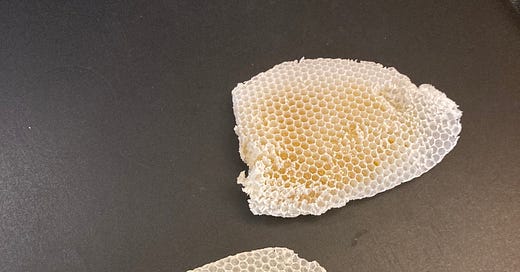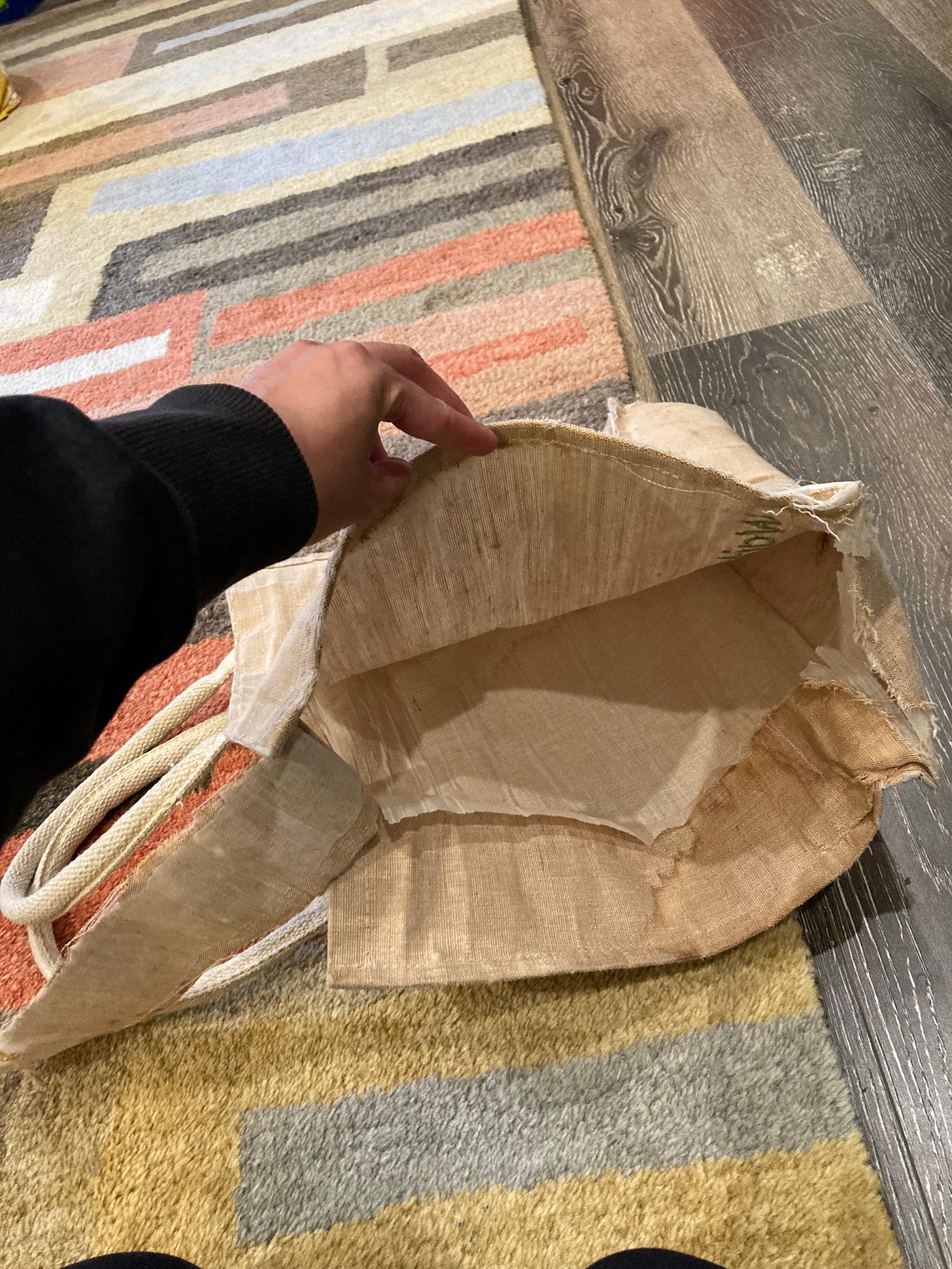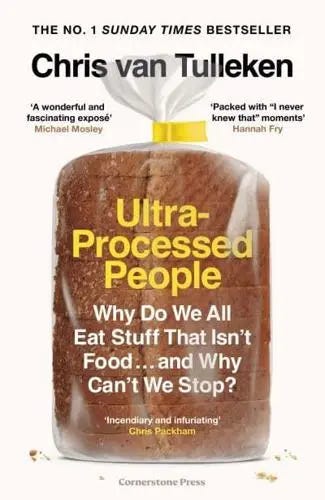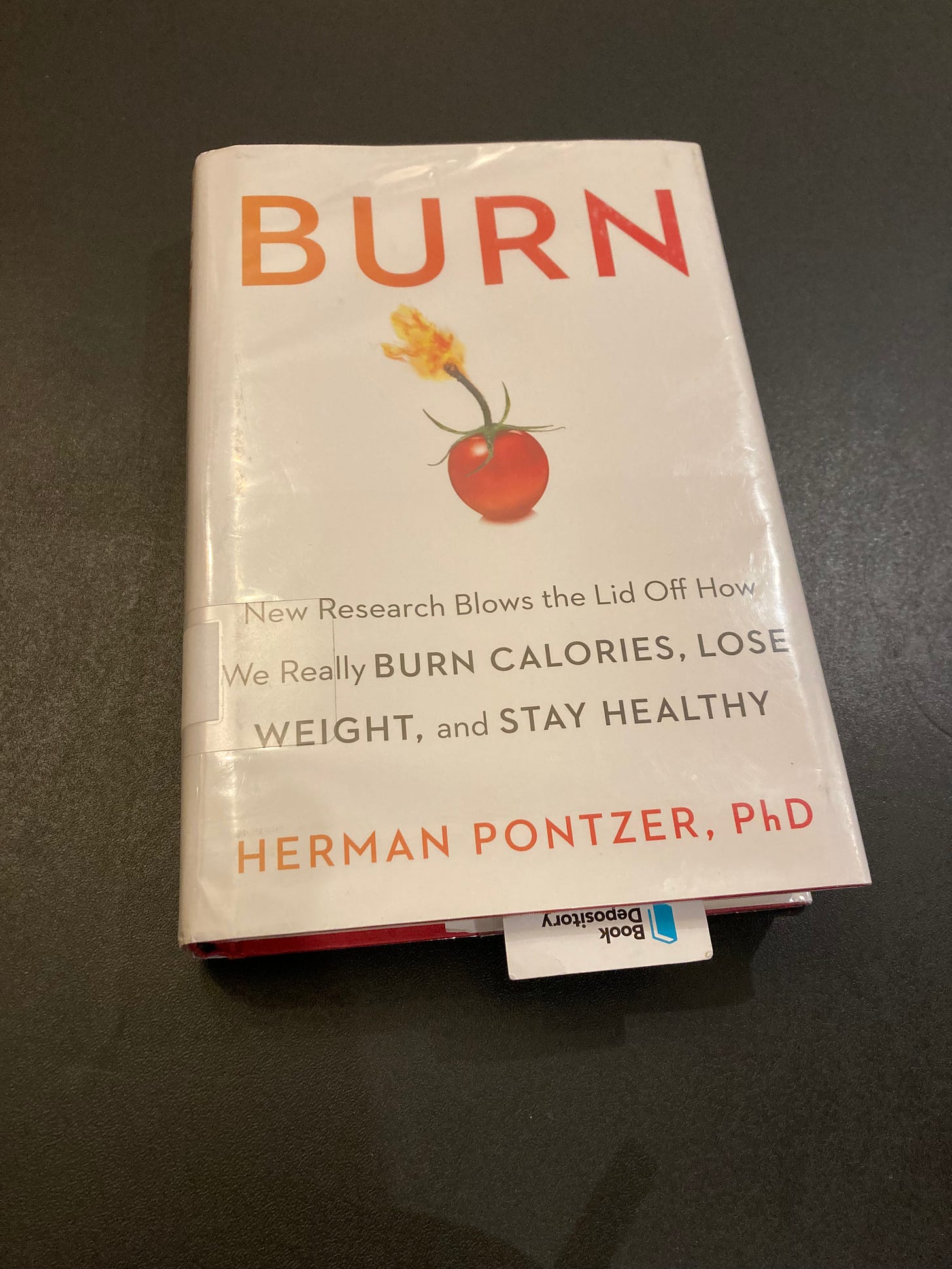The ethical conundrum that is eating without a kitchen
Also books, bees, and the end of the Waitrose bags
Bags for twelve years
Well, in the two weeks since I last wrote, my old Waitrose bags finally carked it. One of them had its side panel completely ripped apart, and the handle of the other one is falling off again — it has already been subjected to home mending but there isn’t enough material left for further stitching so I think it’s time to call it a day on that one too. I guess twelve years isn’t so bad for reusable shopping bags; if we measure this in human years they would have finished primary school!
Accidentally beekeeping
In the construction site that is our current backyard, there are a lot of nooks and crannies that are apparently good spots for bees to build hives. In the past couple of weeks we’ve had two separate incidents of bee swarms (the bee guy who came to move them reckons the second lot were related to the first lot — cousins, maybe?). The second time this happened, they had been there for long enough to start building a home and there was even some honey in the honeycomb that was left behind. I’m told that I can squeeze the honey out of it but I haven’t got around to looking up how to do that yet. Also I like looking at the intact pieces of honeycomb. They’re so cool! If anyone reading this is experienced in beekeeping and knows how best to get honey out of honeycomb, let me know.
Trying to eat ethically during kitchen construction
Readers of the annual editions of ‘Shitty Housewife Gets Nerdy’ may recall that I had subtitled the 2021 newsletter ‘In which she tries very hard not to sound like a pompous twat’. This was because that was the year that I fully committed to buying pasture-raised meat through Farm Foods, continued buying fruit and veg through an amazing CSA program, Yasukochi Family Farms, tasted every brand of organic milk we could find to see which one tasted best and was worth the price premium, and tried to be as ethical as I could with our food choices.
This style of eating didn’t end as 2021 drew to a close. We continued eating like that through 2022, and the first few months of 2023. It is possible to eat like that when you have a stove, an oven, and a kitchen sink. A fully equipped kitchen, basically. When most of the contents of your kitchen are in a storage unit, you’re mostly using a slow cooker, microwave, and toaster oven, AND you’re trying to feed a family of four, cooking from scratch gets considerably more difficult. So how has ethical eating been going so far?
Well, not great, to be honest. In February (a month before we lost the kitchen), I placed an order through Farm Foods and got ground beef and some steaks, and we’re still working through that. So for beef, things haven’t changed. We’re still buying Maple Hill milk. We continued buying dried beans from Rancho Gordo because, thank goodness, I found out I can still cook them in the slow cooker. We mostly stopped buying eggs because they were hard to cook well. We started going to the farmers’ market more regularly (and I made a point of buying from the Yasukochi stand). But there have been things that have changed too.
We used to buy our chicken from Pasturebird, and the chickens on their farms are raised on pasture, free to explore and forage and peck at grubs and bugs — free to naturally be chickens. They’re the supplier of chicken for Farm Foods, which is how I learnt of their existence, and I discovered that it was cheaper to buy directly from Pasturebird than Farm Foods. So I had a monthly subscription to Pasturebird where once a month I’d get a whole chicken, a half chicken, two packages of chicken breasts, and four packages of chicken thighs. It worked a treat. I’d roast whole chickens, make chicken noodle soup, make chicken stock from the bones, and it all tasted better than supermarket chicken.
Since we lost the kitchen, I haven’t cooked any chicken, and the chicken we have eaten is pre-cooked chicken from Trader Joe’s or if we order it when we go out. Which leaves me feeling conflicted. There’s guilt, because I highly suspect that Trader Joe’s and the restaurants we go to are not sourcing their chickens from farms where the birds are raised on pasture with the freedom to roam and forage. I haven’t confirmed this, but it seems far more likely that the chicken we eat now is probably raised on farms that are part of the industrial food system, where both farmers and chickens are treated poorly and the only ones winning are the large chicken processing corporations like Tyson. As a result, chicken doesn’t make it onto the meal plans very often anymore, but whenever I do eat or serve it, it’s not without a measure of guilt. I know better, I should do better! But also it’s hard and there are only so many times I can feed my family lentil minestrone.
The other thing that has changed is where we get our fruit and veg. We used to get a huge box of fruit and veg every week through the CSA, including things I didn’t recognise or know how to cook (there have been many photos of new-to-me vegetables that I’d send to my neighbour Pat, who’s also a food enthusiast and got the same CSA box, along with the message ‘what is this and what do I do with it?’). Often what would end up happening was about a third of the box would be eaten raw, a third would be roasted, and a third would be steamed. Those were by far the easiest ways to serve and prepare vegetables.
Since construction started, we stopped the CSA subscription, and a lot of our veg consumption has been salad kits from the supermarket. They are easy, but there is also a lot of plastic waste that is generated. And I’m not entirely sure of the provenance of the vegetables, how their packaging affects the taste and nutrients, and the many steps that must be involved in turning produce from the field into something that’s already cut and sliced in a bag — what is the industrial process you have gone through, salad? And the other fruit and veg has been primarily from the supermarket too, apart from the odd trip to the farmers’ market. Which makes me wonder about things like the working and living conditions of the farmworkers and truck drivers who bring the produce from the field to the supermarket shelves. It seems to be a much longer, and much more unknowable, supply chain than when we were sourcing our fruit and veg through the CSA.
And then there has been an increase in the amount of pre-prepared meals we’re eating, and in eating out. Not as much as during the beginning of construction because I learnt that I didn’t really like doing that, but definitely still more than in the old days. More ethical stumbling blocks there, largely because information about supply chains and ingredient-sourcing is so hard to come by — probably because it’s not good news. I am appreciating the ease with which I can ‘cook’ dinner by opening a packet and sticking it in the microwave, and if I don’t think too hard about what it is and how it got to me, then it’s okay. On those nights, the motto I go by is ‘well, at least we’re fed’. Like parenting, it’s just one day at a time and one meal at a time.
Books! Again!
I recently finished a book that I want to shout from the rooftops about: Ultra-Processed People by Chris van Tulleken. This is an immensely readable book about a topic that I think we should all care about: ultra-processed foods (if that wasn’t obvious from the title). There’s some science, some economics, some food history, good storytelling, and a great examination of the effects of those food-like substances that so many of us consume.
I have been reading a lot about the food industry over the past few years, and about ultra-processed foods, and there are some characters that keep appearing: Carlos Monteiro, a Brazilian professor of nutrition who, along with his team, devised the NOVA classification of food; Kevin Hall, who did a study on ultra-processed foods and found that people when on an ultra-processed food diet consumed about 500kcal more per day than when fed a whole food diet (all macronutrients and calories being equal); Gorgy Scrinis, an associate professor of food politics and policy who came up with the term ‘nutritionism’; and Dana Small, a psychologist and neuroscientist who did a study about the effect of artificial sweeteners and found that there are physiological impacts when there is a mismatch between sweetness and calories in the food and drinks we consume. These people and their work all make appearances in this book, and I found it to be a thorough and engaging investigation of the current state of ultra-processed foods and its impact on our bodies.
A book I’m currently reading is Burn by Herman Pontzer. His research was mentioned in both Ultra-Processed People and Ravenous (mentioned in the last newsletter), so I thought I’d go to the source. There was one thing that stood out to me in both Ultra-Processed People and Ravenous — that everyone burns the same amount of calories no matter how active they are; that humans have a pretty set and narrow window of daily energy expenditure. If you’re active (like if you live in a hunter-gatherer society and spend five hours a day searching for food, or if you’re an athlete or someone who partakes in regular exercise), then your body makes up for the energy expended through exercise by slowing down some of its other systems and functions, like the immune system or the reproductive system. And that this is why exercise is good for you — not for weight loss, but because some of those systems benefit from slowing down, and regular exercise won’t change weight dramatically but it will reduce inflammation and adrenaline and cortisol levels, among other benefits.
Like Ultra-Processed People, Burn is a delight to read. It’s funny, engaging, and the science-y bits (most of the book) are explained in a way that even I, an extremely non-science-y person, can comprehend. If your reading budget only allows you to take one recommendation from me, read Ultra-Processed People. But Burn is a close second.







